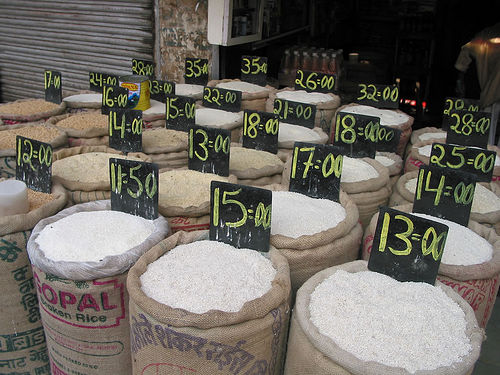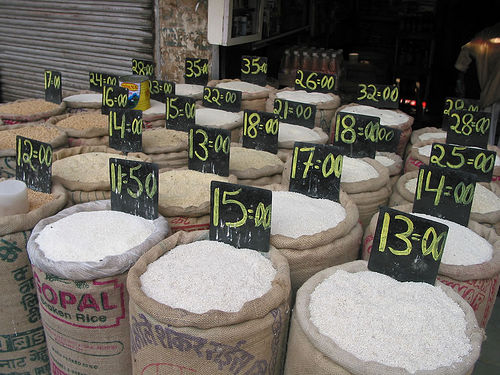 Rice for sale in Colaba Market, Mumbai.Photo: DeyOne of my favorite agriculture researchers in the United States is Tim Wise of Tufts University. Turns out, he writes for my new favorite economics blog, Triple Crisis, in which rogue (i.e., non-neoclassical) economists analyze in plain English the globe’s financial, development, and environmental crises (manifesto here).
Rice for sale in Colaba Market, Mumbai.Photo: DeyOne of my favorite agriculture researchers in the United States is Tim Wise of Tufts University. Turns out, he writes for my new favorite economics blog, Triple Crisis, in which rogue (i.e., non-neoclassical) economists analyze in plain English the globe’s financial, development, and environmental crises (manifesto here).
Wise has an extremely interesting recent post on the question of ag-commodity prices and poverty in the global south. What happens to poor people when prices for basic foodstuffs like rice and wheat rise? Wise shows that the conventional view goes like this: it depends on whether you are a net seller of food (i.e., a farmer), for whom higher prices are beneficial; or a net buyer (e.g., an urban dweller), for whom higher prices are harmful. Not so fast, Wise argues, citing new research.
Higher ag prices, it turns out, have an interesting effect: they can improve livelihoods for small-scale farmers and urban residents alike. How? When ag prices drop, people flee the countryside for the city, depressing wages for urban workers. Low-resource people in countryside and in cities both lose.
But when prices go up, writes Wise, “The demand for unskilled labor in agriculture goes up, which raises incomes, and raises wages not just in agriculture but generally across unskilled labor markets.” However, Wise warns that severe price volatility, which we’ve experienced since 2008, hurts everyone — “except the traders and speculators.” He concludes:
Stable and remunerative prices should be the goal. That is what will attract investment into agriculture and bring long-term benefits beyond the short-run effects.
Wise is thus calling for a gradual rise in ag commodity prices, which have followed a long-term downward trend for at least 50 years, driving millions of farmers across the globe into ruin. I agree, but would add that it matters how such a price hike comes about. Prices should rise because the real costs of food production — including fair wages and environmental protection — get accounted for; and not due to some insane scheme to concoct dubious new uses for food crops … such as burning them to propel cars.



